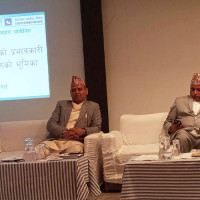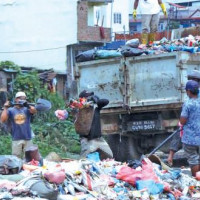- Saturday, 21 February 2026
Need To Overcome The Condition Of Anomie
Nepal is in the labyrinth of a critical juncture of history. The nation’s site into the global conflict zone has attracted the interest of great powers and the free ride of deep state agencies. Information-driven Generation Z (Gen Z)’s revolt has exposed it to the condition of anomie brought by high political dynamics and the throes of an excruciating leadership transition. A conflict environment has set a strategic context for various forces for unfair competition to earn wealth, power, and position.
Anomie is a situation of the shortfall of norms, laws and constitutional conduct of powerful actors. Emile Durkheim says that the breakdown of regulatory order is the cause of institutional erosion and failure to coordinate the expectations of elites and the masses to keep social cohesion, order and peace. The erosion of the Nepali state, caused by the illegitimate distribution of all state posts, except the Nepal Army, to the clients of mainstream parties without a record of performance, has disabled them from serving impersonally to national interests, cultivating good citizens and combating the wild manifestation of anomic behaviour driven by instinct, emotion, impulse and passion by awakening conscience.
Corrosion of output legitimacy
Nepali polity is long marked by the corrosion of output legitimacy and trust in institutional authority, melted power separation, checks and integrity of power into fractious parties and created political volatility where each force- parties, interest groups and deep state enter into illegitimate bargains. Anomie amounts to a lack of respect for democratic opposition and the temptation of each political party and interest group to come to power by stirring against the dominant political parties, making the legislature irrelevant and the constitution contested.
Robert Merton equates anomie as the outcome of deviation from the established rule. As the bulk of youths find social mobility only through migration from rural to urban areas and abroad, they utilise universal value systems beyond hierarchy, patriarchy, centralisation of leadership and prejudices of party politics, seeking a shift from the status-bound leadership to an achievement-oriented one.
The risk of counter-revolution of old parties in Nepal springs from the lowering of the status of old leaders by indictment and the growing density and disunity of game players. High scale of anomie emanates from the formation of parliamentary, anti-parliamentary, anti-constitutional and anti-system dissidents, restive factionalism within each political party and loose links of leaders with diverse groups of society owing to their political culture of patronage and syndicated regime and the rise of network politics of Gen Z unleashed by digital media.
This network politics of youths, populist parties, radical forces, identity-based actors and deep state has beset the power of dominant parties ruling the nation in an as usual way in an unusual circumstances and emotionalised the movement of Gen Z with the expression of demands for digital freedom, anti-corruption drive, end to impunity, direct election of the executive and creation of good governance. Management of anomie requires several considerations:
Regime change: For the frustrated masses, regime change has generated a politics of hope. But within less than a month, the Gen Z revolt turned into despair as the negotiation between the new regime and President Ram Chandra Poudel representing parties ended in the limitation of the mandate of revolt to hold parliamentary elections on March 5, inquiry against rights violations, reconstruction of destroyed infrastructures, etc. The mood of revolt of Gen Z to disrupt party structures and the counter-revolutionary mood of senior leaders of NC and CPN-UML might push national politics into a collision course and draft Nepalis into violent conflict if various political forces do not engage in legitimate paths of power and democratic legitimacy and accountability.
The earlier coalition of the government of NC and UML with almost two-thirds majority made Rastriya Swotantra Party (RSP), Rastriya Prajatantra Party, CPN-Maoist Centre and several social forces difficult to gain constitutional path of power and supported Gen Z revolt to dislodge the regime, thus deviating from lawful channels of power acquisition. A set of traditional parties struggles to seek conformity to the nation’s old tradition of monarchy, unitary polity and Hindu state.
UML leaders smell the support of geopolitical forces to dislodge Prime Minister KP Sharma Oil for his interest in improving ties with Russia, India and China and meeting their top leaders in the SCO conferences and assuming a patriotic stand on Lipulek. The UML deems the new government illegitimate, brought by Western support, while the new regime calls the old regime corrupt and authoritarian. NC and CPN-UML want to restore the parliament and dislodge the new regime, while the latter wants it to accept the reality and join the electoral path.
The irreconcilable paths might set confrontational politics, which can plunge the nation into a cycle of insecurity, entailing an increased role of the Nepal Army. The trilemma for Prime Minister Sushila Karki is whether to succumb to Gen Z pressure to indict those responsible for the death of innocent youths, placate the old parties’ protests against any vengeful action, who sense doubt over the holding of elections under weak security or bring monarchist parties in reconciliation. So long as the politics of revenge, negation and impunity remain unaddressed, democratic stability is less likely to be achieved.
The government has to build bridges across the rival forces seeking to criminalise each other and enable them to accept national responsibility. Ironically, anomic condition has offered psychopaths an opportunity to flock around power bargains, not rational adjustment of politics to people’s needs for justice, progress and peace.
Breaking the suffocating milieu: the formation of a new government mediated by President Poudel muted the fear of overstepping of Gen Z commotion and the suffocating gimmick of closed rooms and streets. The problem with Gen Z is that it lacks cohesive political organisation and programmes, unified leadership, effective electoral strategy and social mobilisation at the grassroots level to bring their dissimilar orientation into a common ground for electoral prospects. It's landing from the digital world to the ground has yet to build a political constituency.
The people’s power that asserted in various phases of history for regime change, however, ended in a compromise of powerful actors. Each time, the reformist agenda simply ended in a deepest false dawn. The restoration of the parliament might trap Nepali politics in a dead-end and further cripple the peaceful path. The younger generations of party leaders are enthralled by the winds of change. Maoist Centre and RSP seem ready to participate in elections but demand direct elections of the executive head, while monarchist forces are calling for national reconciliation to restore the monarchy or face decisive revolt.
In the all-party meetings, President Poudel told leaders not to seek alternatives to elections, where Gen Z groups have suggested the government take action to kill people and nationalise the property of the corrupt. The nexus of crime to politics is evident from the withdrawal of criminal and corruption cases from the courts. Shifting loyalty of voters is precisely the reason for this and the struggle of the youth for leadership change.
Self-determination: free and fair election allows opportunity for the sovereign people to exercise their choice in the selection of leadership, organisation and programme and peacefully circulate each social class and generation into political power. It can garner legitimacy; reduce the use of money in politics, media manipulation. In varied societies with multiple identities like Nepal, forging cross-cutting cultural and political ties can scale up perspective at the national scale for self-determination on issues and policies and prevent external penetration and disruptive actions of deep state agencies.
Anomie has occurred as ideological solidarity of parties faced contradiction with their de-ideologisation, while information-driven generation is challenging them with their network politics seeking to overcome their deprivation from opportunities owing to excessive patronage, leadership centralization and partiocracy. Political parties’ transition from ideological solidarity to networking has generated normative loss of discipline and a psychological state of doubt, forcing the cadres to swap sides, thus resembling rats deserting a sinking ship. The revolt of youths has offered an opportunity for inter-generational renegotiation of politics.
Mutual cooperation
Mutual aid: the mutual aid of political parties, government and security agencies is vital to create a rule of law and public security, an election-friendly milieu, retrieve their arms looted by infiltrators and bring back the criminals escaped from jails. It can cease conflict of interest groups with the authorities demanding a monopoly of opportunities at the cost of the people. Without tackling the difficult political issues between the government and political parties, the security sector anomie will only continue and politics of greed and grievances can exhaust political will for worthy initiatives –institutional reforms and democratisation of the inner life of political parties.
Distrust across political and security forces might create a structural context conducive to sparking rows, anomies, polarisation, sub-national identity formation, mobilisation and counter-mobilisation of followers, marking the climb of anomie, contesting constitutional spirit and the rise of counterculture. It is here that many high-leverage actors like the President, business community, civil society and critical mass should break the barriers to communication, organise broad-based dialogue and shape a common bottom-up nature of national vision to steer the nation in a shared path of stability, progress and peace.
(Former Reader at the Department of Political Science, TU, Dahal writes on political and social issues.)






-original-thumb.jpg)








